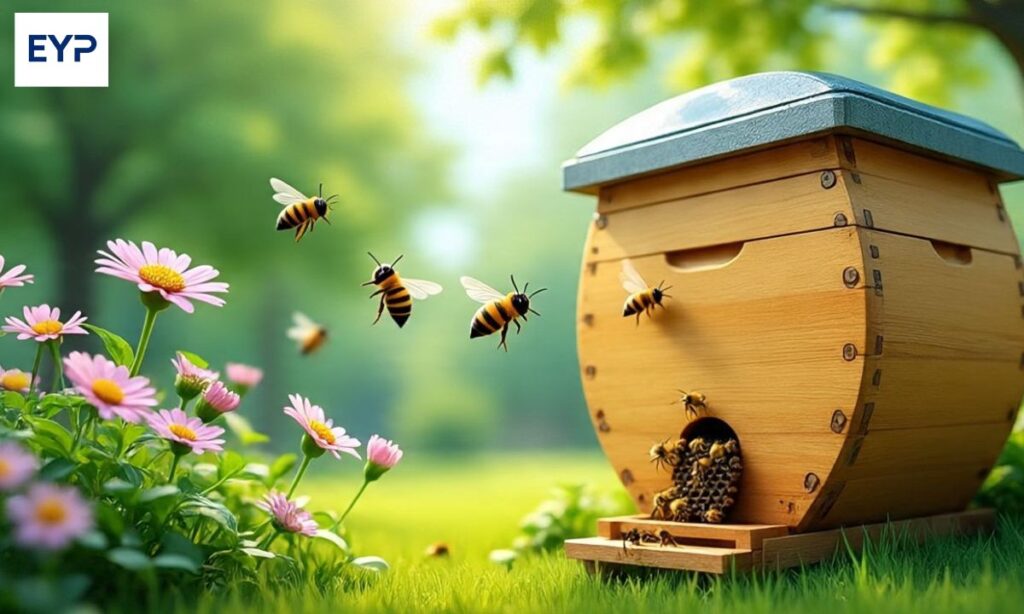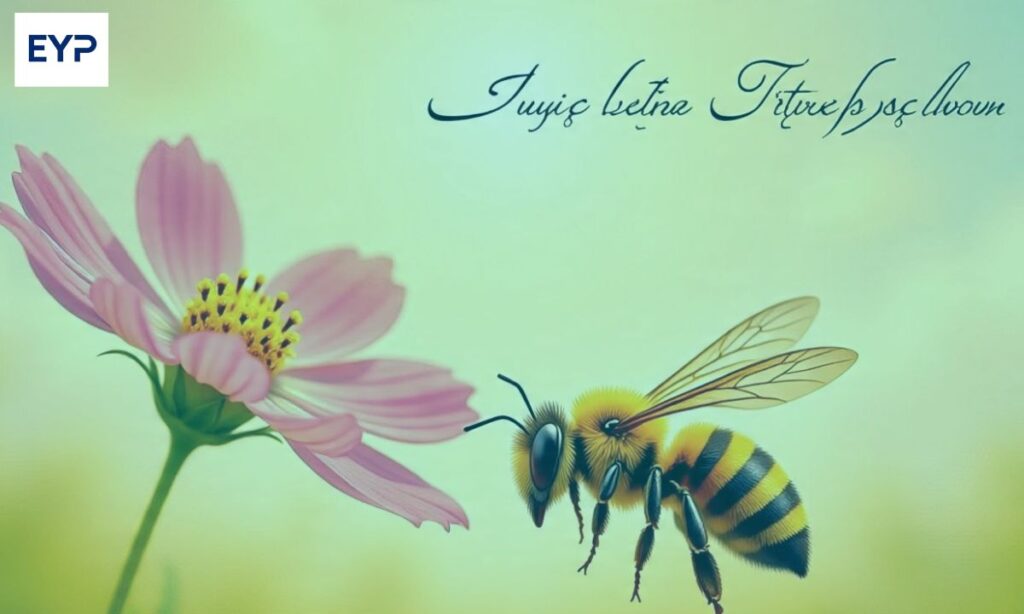Bees appear throughout the Bible as powerful symbols with deep meaning. These small creatures teach us important lessons about life and faith. The Bible uses bees to show us how to work hard and stay busy.
It also uses honey to represent sweet blessings from God. Biblical writers chose familiar animals to help people understand spiritual truths. They knew everyone could relate to seeing bees buzzing around flowers.
Symbolism of Diligence and Hard Work
Proverbs 6:6
“Go to the ant, you sluggard; consider its ways and be wise!”
While this verse specifically mentions ants, it establishes the biblical principle of learning from industrious insects. The connection to bees is natural and complementary, as both creatures demonstrate unwavering dedication to their work. The Hebrew word “sluggard” refers to someone who is habitually lazy and avoids responsibility. In contrast, bees work tirelessly from dawn to dusk, gathering nectar, building honeycomb, and maintaining their hive. This verse challenges believers to examine their own work ethic and commitment to their responsibilities.
The wisdom literature of Proverbs frequently uses observations from nature to teach moral lessons. Just as bees instinctively understand the importance of their daily labor for the survival of the colony, humans should recognize that diligent work is essential for personal growth and community flourishing. The bee’s example teaches us that consistent, purposeful effort yields lasting results.
Proverbs 30:25
“Ants are creatures of little strength, yet they store up their food in the summer.”
This verse emphasizes preparation and foresight, qualities that bees demonstrate remarkably well. Bees work intensively during favorable seasons to store honey for winter months when flowers are scarce. This natural behavior illustrates the biblical principle of wise stewardship and planning ahead. The verse suggests that even small, seemingly insignificant creatures can teach humans valuable lessons about responsibility and prudence.
In the spiritual realm, this preparation represents the importance of building up spiritual resources—prayer, study, fellowship, and service—during seasons of blessing and opportunity. Just as bees cannot survive winter without their stored honey, believers need spiritual reserves to sustain them through difficult times.
Ecclesiastes 3:1
“There is a time for everything, and a season for every activity under the heavens.”
The Teacher in Ecclesiastes recognizes the rhythm and timing that governs all life, including the seasonal work patterns of bees. Bees understand natural timing—when to forage, when to build, when to protect the hive, and when to rest. This verse reflects the wisdom of working in harmony with God’s timing rather than forcing outcomes or neglecting appropriate seasons for different activities.
For believers, this principle means recognizing that spiritual growth and service have their own seasons. There are times for intensive work and times for rest, times for sowing and times for harvest, times for building and times for reflection. The bee’s instinctive understanding of seasonal rhythms provides a model for living in sync with God’s design.
Proverbs 12:24
“Diligent hands will rule, but laziness ends in forced labor.”
This verse contrasts the outcomes of diligence versus laziness, using the metaphor of hands to represent one’s approach to work. Bees exemplify diligent hands through their constant activity and purposeful labor. In a beehive, every bee has a role and contributes to the collective good. Worker bees don’t shirk their responsibilities; they understand that the survival of the entire colony depends on each individual’s contribution.
The promise that “diligent hands will rule” suggests that consistent, faithful work leads to positions of responsibility and influence. In the spiritual realm, this principle applies to Christian service and character development. Those who faithfully serve in small things are entrusted with greater responsibilities.
Proverbs 14:23
“All hard work brings a profit, but mere talk leads only to poverty.”
This verse distinguishes between productive action and empty words. Bees don’t waste time discussing their plans—they act decisively and purposefully. Their hard work literally brings profit in the form of honey, which has been valued throughout human history as food, medicine, and trade commodity.
The contrast between work and “mere talk” challenges believers to move beyond good intentions to concrete action. Like bees that transform nectar into valuable honey through their labor, Christians are called to transform their faith into tangible works of love and service.
Symbolism of Sweetness and Prosperity
Psalm 19:10
“They are more precious than gold, than pure gold; they are sweeter than honey, than honey from the honeycomb.”
The psalmist compares God’s laws and commands to honey fresh from the comb—the purest, most desirable form of this natural sweetness. This comparison elevates Scripture above material wealth and earthly pleasures. Just as honey provides immediate satisfaction and long-term nourishment, God’s word offers both present comfort and lasting spiritual sustenance.
The reference to “honey from the honeycomb” emphasizes purity and freshness. Comb honey was considered the finest quality, unprocessed and direct from the bees’ work. Similarly, God’s word in its pure form provides unmatched spiritual nourishment and delight.
Deuteronomy 8:8
“A land with wheat and barley, vines and fig trees, pomegranates, olive oil and honey.”
This description of the Promised Land includes honey as one of its defining characteristics of abundance. The presence of honey indicates a thriving ecosystem with abundant flowers and active bee populations. In ancient times, honey was one of the few sources of sweetness available, making it a luxury item that represented prosperity.
The inclusion of honey in this list of divine provisions demonstrates God’s care for both necessity and pleasure. He doesn’t merely provide survival needs but includes elements that bring joy and sweetness to life. This reflects the character of a God who desires His people’s happiness and well-being.
Proverbs 16:24
“Gracious words are a honeycomb, sweet to the soul and healing to the bones.”
This verse draws a direct parallel between kind words and honeycomb, emphasizing both the sweetness and the healing properties of gentle speech. Honey has been used medicinally throughout history for its antibacterial properties and ability to soothe wounds and sore throats. Similarly, gracious words provide emotional and spiritual healing.
The metaphor suggests that just as bees create something beautiful and beneficial from their work, humans can create healing and encouragement through thoughtful, kind communication. The comparison to honeycomb also implies that gracious words, like honey, become more valuable and appreciated over time.
Judges 14:8
“Some time later, when he went back to marry her, he turned aside to look at the carcass of the lion, and in it he saw a swarm of bees and some honey.”
This account from Samson’s story presents a striking image of sweetness emerging from death and destruction. The lion that once threatened Samson’s life has become the foundation for a bee colony producing honey. This transformation symbolizes how God can bring blessing and sweetness from the most unlikely circumstances.
The bees’ ability to create their home and produce honey within the lion’s carcass demonstrates their remarkable adaptability and industriousness. For believers, this image suggests that even in the aftermath of difficult battles or losses, God can bring forth new life and unexpected blessings.
Matthew 3:4
“John’s clothes were made of camel’s hair, and he had a leather belt around his waist. His food was locusts and wild honey.”
John the Baptist’s diet of wild honey reflects both his ascetic lifestyle and his reliance on God’s natural provision. Wild honey, gathered from bees living in trees and rock crevices, represented pure, unprocessed nourishment available to those who sought it in nature. This detail emphasizes John’s separation from conventional society and his dependence on divine provision.
The mention of wild honey also connects John to the prophetic tradition, as several Old Testament figures survived on simple, God-provided sustenance. The honey represents the sweetness of God’s provision even in wilderness circumstances.
Symbolism of Judgment and Consequences

Exodus 23:28
“I will send the hornet ahead of you to drive the Hivites, Canaanites, and Hittites out of your way.”
God promises to use hornets—aggressive relatives of bees—as instruments of judgment against Israel’s enemies. This verse demonstrates God’s sovereignty over nature and His ability to use even small creatures to accomplish His purposes. The hornet’s aggressive nature and painful sting make it an effective symbol of divine intervention that drives out opposition.
The use of hornets rather than large armies or dramatic supernatural events emphasizes that God’s power doesn’t require overwhelming display. Small, persistent pressure can be more effective than dramatic confrontation in accomplishing divine purposes.
Deuteronomy 1:44
“The Amorites who lived in the hill country came out against you. They chased you like a swarm of bees and beat you down from Seir all the way to Hormah.”
This verse uses the imagery of a bee swarm to describe the fierce pursuit by Israel’s enemies. When bees perceive a threat to their hive, they respond with overwhelming numbers and aggressive determination. The comparison emphasizes the relentless, coordinated nature of the Amorite attack.
The metaphor also suggests consequences for disobedience. Just as disturbing a beehive results in aggressive retaliation, Israel’s failure to trust God’s promises led to defeat and pursuit by their enemies. The bee swarm imagery conveys both the intensity and the justness of the consequences they faced.
Psalm 118:12
“They swarmed around me like bees; they were extinguished as quickly as burning thorns; in the name of the Lord I cut them down.”
The psalmist describes being surrounded by enemies using bee imagery, emphasizing both the overwhelming nature of the threat and its ultimate defeat. Bee swarms can appear suddenly and seem impossible to escape, yet they can be dispersed just as quickly under the right circumstances.
The comparison to “burning thorns” adds another dimension—thorns burn fiercely but briefly, suggesting that intense opposition, while frightening, may be short-lived when faced with divine intervention. The psalm celebrates God’s power to deliver from seemingly impossible situations.
Isaiah 7:18
“In that day the Lord will whistle for the fly that is in the distant streams of Egypt and for the bee that is in the land of Assyria.”
This prophetic verse presents God as summoning insects from distant lands to serve His purposes of judgment. The image of God whistling for bees suggests complete control over nature and the ability to direct even small creatures according to His will.
The geographical references to Egypt and Assyria indicate that God’s judgment will come from foreign nations, but the insect imagery emphasizes that the ultimate source of these troubles is divine, not merely political or military.
Hosea 13:3
“Therefore they will be like the morning mist, like the early dew that disappears, like chaff swirling from a threshing floor, like smoke from a window.”
While this verse doesn’t explicitly mention bees, it occurs in a context of describing swift judgment, and the original document connects it to bee-like imagery representing the quick, overwhelming nature of divine consequences for disobedience.
The multiple comparisons to things that disappear quickly emphasize the transient nature of prosperity that isn’t grounded in faithfulness to God. Like a bee swarm that can appear suddenly and disperse just as quickly, human achievements without divine blessing prove ephemeral.
The Nature of Bees and Their Behavior
Proverbs 24:13
“Eat honey, my son, for it is good; honey from the comb is sweet to your taste.”
This simple encouragement to enjoy honey reflects the biblical principle that God’s creation includes pleasures meant for human enjoyment. The verse doesn’t merely tolerate the consumption of honey but actively encourages it as something good and beneficial.
The reference to honey “from the comb” emphasizes the natural, unprocessed quality that provides maximum benefit and pleasure. This suggests that God’s best gifts often come in their most natural, unaltered forms, and that simple pleasures can be deeply satisfying when received with gratitude.
Song of Solomon 4:11
“Your lips, my spouse, drip as the honeycomb; honey and milk are under your tongue. The fragrance of your garments is like that of Lebanon.”
In this passionate love poem, honey becomes a metaphor for the sweetness of intimate communication and affection. The image of lips dripping with honeycomb suggests words that are both sweet and abundant, flowing naturally from a loving heart.
The combination of honey and milk represents the richness and satisfaction found in deep, committed love. Both substances were valuable in ancient times, and their pairing suggests luxury, nourishment, and complete satisfaction.
Job 20:16
“He will suck the poison of serpents; the fangs of an adder will kill him.”
While this verse focuses on dangerous serpents rather than beneficial bees, it provides contrast within the broader biblical use of natural imagery. The document notes how this reference to nature’s dangers highlights the positive symbolic use of bees in other contexts.
This contrast emphasizes that nature contains both blessing and danger, and that wisdom involves discerning the difference. Unlike poisonous creatures that bring harm, bees generally represent positive qualities and beneficial outcomes.
Revelation 10:9
“So I went to the angel and asked him to give me the little scroll. He said to me, ‘Take it and eat it. It will turn your stomach sour, but in your mouth it will be as sweet as honey.'”
This apocalyptic vision uses honey’s sweetness to describe the initial appeal of divine revelation, which may become difficult to digest fully. The contrast between the sweetness in the mouth and the sourness in the stomach illustrates how God’s truth can be simultaneously appealing and challenging.
The honey metaphor suggests that divine messages often begin with an attractive, sweet quality that draws people in, but their full implications may prove demanding or difficult to accept completely.
Ezekiel 3:3
“Then he said to me, ‘Son of man, eat this scroll I am giving you and fill your stomach with it.’ So I ate it, and it tasted as sweet as honey in my mouth.”
Similar to the Revelation passage, Ezekiel’s prophetic experience involves consuming God’s word, which tastes like honey. This sweetness represents the inherent appeal and goodness of divine revelation, even when its message may be challenging.
The honey comparison emphasizes that God’s word, regardless of its content, possesses an essential sweetness that satisfies spiritual hunger and provides deep nourishment to those who receive it with faith.
Bees in Everyday Life and Symbolism

Leviticus 11:21
“However, you may eat cicadas of any kind that have wings. But all other flying insects that have four legs you are to regard as unclean.”
This dietary law provides context for understanding ancient attitudes toward insects, including bees. While the verse doesn’t mention bees specifically, it establishes the framework within which bees were understood as part of God’s created order with specific purposes and classifications.
The careful attention to different types of insects demonstrates the detailed nature of biblical law and the importance placed on understanding and respecting the distinctions within God’s creation.
Numbers 13:27
“They gave Moses this account: ‘We went into the land to which you sent us, and it does flow with milk and honey! Here is its fruit.'”
The spies’ report about the Promised Land prominently features honey as evidence of the land’s abundance and fertility. The phrase “flowing with milk and honey” became a standard description of divine blessing and provision, with honey representing the sweetness of God’s promises fulfilled.
This report demonstrates that honey was considered valuable enough to serve as evidence of a land worth possessing. The presence of honey indicated not just sustenance but prosperity and the kind of abundance that makes life enjoyable.
1 Samuel 14:27
“But Jonathan had not heard that his father had bound the people with an oath; so he reached out the end of the staff that was in his hand and dipped it into the honeycomb. He raised his hand to his mouth, and his eyes brightened.”
Jonathan’s experience with honey demonstrates its immediate energizing and refreshing qualities. The detail that “his eyes brightened” after eating honey illustrates the quick boost in energy and clarity that honey provides, making it valuable for warriors and workers.
This account also shows honey’s accessibility in the natural environment, available to those who knew where to look for it. The honeycomb Jonathan found represents God’s provision even in wilderness circumstances.
Exodus 3:8
“So I have come down to rescue them from the hand of the Egyptians and to bring them up out of that land into a good and spacious land, a land flowing with milk and honey.”
God’s promise to Moses includes honey as a defining characteristic of the land He intends to give His people. This promise associates honey directly with divine deliverance and blessing, making it a symbol of God’s faithfulness to His covenant.
The repetition of the “milk and honey” description throughout Scripture demonstrates its importance as a symbol of complete provision—not just basic needs, but abundance that includes pleasure and sweetness in life.
Job 33:24
“Then he is gracious to him and says, ‘Deliver him from going down to the pit; I have found a ransom for him.'”
While this verse doesn’t explicitly mention bees or honey, the document connects it to the concept of deliverance being metaphorically sweet, like honey. The idea of finding a ransom and preventing destruction can be seen as sweet relief, similar to the satisfaction honey provides.
This connection suggests that God’s interventions in human lives, particularly His acts of deliverance and redemption, possess a sweetness that satisfies the deepest human longings for security and restoration.
Conclusion
The biblical use of bees and honey reveals the richness of Scripture’s natural imagery and its relevance to spiritual life. From industriousness and preparation to sweetness and judgment, these creatures and their products serve as multifaceted symbols that continue to instruct and inspire believers today.
The consistency of these images throughout Scripture demonstrates their enduring power to communicate divine truth through familiar, observable aspects of the natural world.






